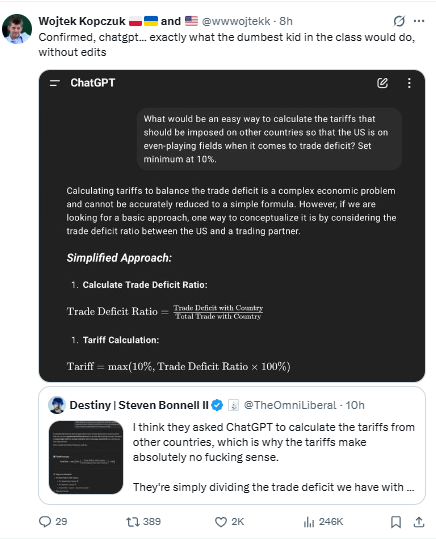Trump Tariff New Plan Matches AI-Generated Formula, Raising Questions
On April 2, 2025, U.S. President announced a new plan that adds extra costs to goods imported from other countries. The Trump Tariff plan sets a minimum 10% tax on all imports and even higher taxes for countries that sell more to the U.S. than they buy. For example, China will face a 34% tax, Japan 24%, and the European Union 20%. The President says this is part of his "Declaration of Economic Independence" and is meant to make trade fair and help American businesses.
But a strange theory is spreading online: Did artificial intelligence help create this policy? Some people on social media, especially on X (formerly Twitter), claim that when they asked AI chatbots like ChatGPT to come up with a trade policy, the answer was almost the same as Trump Tariff plan. This has led to debates about whether AI was involved in shaping the tariffs.
AI and the Trump Tariff Controversy
Just after the Trump Tariff announcement, different users tried to experiment with AI chatbots by questioning how the U.S. could create a reciprocal tariff system. One user, NFT collector DCinvestor, informed his 260,000 followers that ChatGPT generated a calculation. It is very similar to the policy made by the government. The AI tool calculated rates by considering trade deficits and then dividing them by U.S. imports.
Tests by Economist Wojtek Kopczuk also got similar results over different artificial intelligence tools, like ChatGPT, Grok, Claude, and Gemini. This raises concerns if whether ChatGPT has influenced on the trade policy of the Trump Administration.

Source: X
Economic and Market Reactions
The announcement of Trump tariff resulted in a spontaneous backlash from economists, global trade associations, and business leaders. Many expressed that these rates could increase trade complexities and result in higher prices for U.S. consumers.
Ryan Petersen, Ceo of Flexport, a logistics company, reverse-engineered the calculations of the Trump tariff policy and confirmed that it related with the AI-generated formula. Critics said that use of a simplistic formula, without taking major economic factors in consideration, can have a disruptive impact on supply chains. It will be unfavourable for the businesses who only rely on imports.
Financial markets also reacted negatively. Bitcoin and other cryptocurrencies experienced a sharp decline, with BTC price dropping $6,000 to $82,277 before partially recovering, according to CoinGecko. Stock markets also took a hit, with major indices seeing declines as investors feared economic uncertainty.
AI in Policymaking: A New Reality?
The subject that AI-generated economic models' can impact a country’s policy raises concerns. These tools are created to offer logical solutions on the basis of the data available. They do not process other factors like long-term economic stability, geopolitical situations, and diplomatic relations.
However, the similarity between ChatGPT-generated results and the Trump Tariff Policy still highlights the increasing influence of AI in decision-making. Governments are exploring AI-driven strategies, but relying totally on algorithms for economic growth can give unwanted results.
What’s Next?
The tariffs plan is going to be effective on April 5, and their influence on global trade and the crypto market is unpredictable. Some countries can counter-attack with their own Tariffs, again increasing tensions. On the other side, the discussion about AI’s role in administrative policies is going to continue. Particularly because technology is more incorporated in governance.
Also read: What Happened in Crypto Today: Crash Reasons Inside—Check Now免责声明:本文章仅代表作者个人观点,不代表本平台的立场和观点。本文章仅供信息分享,不构成对任何人的任何投资建议。用户与作者之间的任何争议,与本平台无关。如网页中刊载的文章或图片涉及侵权,请提供相关的权利证明和身份证明发送邮件到support@aicoin.com,本平台相关工作人员将会进行核查。



